Elven pantheon: Difference between revisions
| Line 17: | Line 17: | ||
* [[Corellon Larethian]], greater deity and leader of the Seldarine | * [[Corellon Larethian]], greater deity and leader of the Seldarine | ||
* [[Angharradh]], greater deity and consort to Corellon | * [[Angharradh]], greater deity and consort to Corellon | ||
* [[Aerdrie Faenya]], intermediate deity of the wind | * [[Aerdrie Faenya]], intermediate deity of the wind | ||
* [[Deep Sashelas]], intermediate deity of the seas | |||
* [[Erevan Ilesere]], intermediate deity of trickery | |||
* [[Hanali Celanil]], intermediate deity of love | * [[Hanali Celanil]], intermediate deity of love | ||
* [[Labelas Enoreth]], intermediate deity of longevity | * [[Labelas Enoreth]], intermediate deity of longevity | ||
* [[Rillifane Rallathil]], intermediate deity of nature | * [[Rillifane Rallathil]], intermediate deity of nature | ||
* [[Solonor Thelandira]], intermediate deity of hunting | * [[Solonor Thelandira]], intermediate deity of hunting | ||
* [[ | * [[Sehanine Moonbow]], intermediate deity of the moon | ||
* [[Fenmarel Mestarine]], lesser deity of outcasts | * [[Fenmarel Mestarine]], lesser deity of outcasts | ||
* [[Naralis Analor]], lesser deity of suffering, healing and death | * [[Naralis Analor]], lesser deity of suffering, healing and death | ||
* [[Shevarash]], demigod of vengeance | * [[Shevarash]], demigod of vengeance | ||
Revision as of 12:00, 6 August 2020
The Elven Pantheon
The Fair Folk of the Realms worship a pantheon of deities known as the Seldarine (Tel'Seldarine in the elvish language), a complex term that can be roughly translated as the fellowship of brothers and sisters of the wood, implying the wide diversity in interests that exists among the gods of the elven pantheon and their desire for cooperation. They act independently of one another, but the elven powers are drawn together by love, curiosity, and friendship to combine their strengths, to accomplish a task, or in the face of outside threats.
Corellon Larethian, the acknowledged ruler of the Seldarine - sometimes joined by his consort, who is either identified as Sehanine or Angharradh-reinforces this freedom of action and compels none of the Seldarine to perform any task. Instead, the gods of the elven pantheon seem to sense when something needs doing, and they simply gather when necessary. With the exception of Fenmarel Mestarine, the Seldarine reside in the realm of Arvandor - a term that means "The High Forest" in elven - on the plane of Arborea.
Relations ascribed to the various powers of the Seldarine vary widely from culture to culture; some legends hold them all to be brothers and sisters, others believe Corellon (and sometimes Sehanine or Angharradh) created the other powers from the natural environment of Arvandor. Other sages link the Seldarine in various romantic relationships. In most representations, the elven pantheon includes more gods than goddesses, but every member of the Seldarine can appear as either male or female.
The androgynous nature of the Seldarine reflects the gender equality found in most elven societies.
Aside from disagreement over the nature of Angharradh, there is general agreement among the elves of Faerun as to which powers make up the Seldarine. Each elven realm and subrace places its own emphasis on the relative importance of various powers to the point where some members of the Seldarine fade from memory in some isolated elven cultures.
Formal membership in the Seldarine is determined by Corellon (or by Corellon and Angharradh, according to some myths).
The Seldarine
- Corellon Larethian, greater deity and leader of the Seldarine
- Angharradh, greater deity and consort to Corellon
- Aerdrie Faenya, intermediate deity of the wind
- Deep Sashelas, intermediate deity of the seas
- Erevan Ilesere, intermediate deity of trickery
- Hanali Celanil, intermediate deity of love
- Labelas Enoreth, intermediate deity of longevity
- Rillifane Rallathil, intermediate deity of nature
- Solonor Thelandira, intermediate deity of hunting
- Sehanine Moonbow, intermediate deity of the moon
- Fenmarel Mestarine, lesser deity of outcasts
- Naralis Analor, lesser deity of suffering, healing and death
- Shevarash, demigod of vengeance
Arelith
All Gods are now supported mechanically on Arelith. However, not all deities have temples. As a Cleric you can make your own shrines to your god. See the Deity section for more information.
External link
- Seldarine on FR wiki
The following link includes information based on D&D 2nd edition. Some of it may be obsolete in the 3rd edition used by Arelith. Please, see also other resources for any possibly conflicting information:
